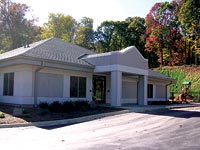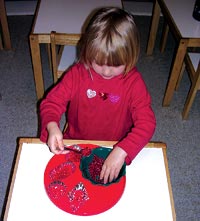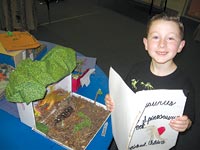The first day of school: a new backpack, a handful of No. 2 pencils and a whole world of opportunity (both socially and educationally) for our little ones. As parents, choosing a school for our kids is one of several momentous decisions we make for them. But what exactly is the difference between a magnet school and a charter school? What is Montessori? And just what kind of perks do private schools provide? Below, a primary-education primer with enough detail to make even the greenest parents school-savvy.
Charter schools

Funded primarily by tax dollars, charter schools provide an alternative to traditional public schools. “Local, state and federal dollars follow the child to a charter school,” notes the State Board of Education Web site. “The schools have open enrollment with no discrimination, no religious associations and no tuition.”
However, charter schools do not benefit from state lottery payouts and often need to do substantial fund raising on their own. Run by diverse groups including private businesses, teacher collectives and community organizations, charters are the new wave of public education, appearing in Western North Carolina in just the past decade. In fact, the movement was largely born in response to demands for public-school reform and is seen as a venue for exploring contemporary, alternative and innovative approaches to education.
Many charter schools specialize in certain subject areas like art or science, some cater to students with behavior or learning challenges and others are developed around a specific model of education, like Montessori or Expeditionary Learning Outward Bound. Charter schools are not subject to the same geographic boundaries as city and county public schools, so any student in WNC can attend one of the Asheville-area charter schools, space permitting.
Another difference: In North Carolina, 75 percent of a charter’s elementary school teachers must be certified, with the remaining 25 percent meeting federal No Child Left Behind standards for highly qualified staff. Charters are required to meet the same benchmarks as other public schools, specifically, the so-called ABC or end-of-grade tests. But, because they exist independently from the local school system, charters are not subject to as much “red tape” and have greater flexibility in determining curriculum and teaching styles than traditional schools. For these reasons, Jackie Williams, executive director of Evergreen Community Charter School, declares: “Charter schools are in a better position to do right by kids.”
Finally, although they are tuition-free, charter schools aren’t always easy to get into. Enrollment is determined by lottery when the number of applications exceeds the number of spaces available.
Magnet schools

Asheville Montessori student Ciara, a
study in reds.
Like charter schools, magnet schools are public institutions oriented around subject specializations such as humanities, technology or ecology; educational methods, like experiential education or core knowledge; or in some districts, alternative or year-round schedules. Magnets, however, exist within the school district. The concept emerged in the 1980s to promote school choice while establishing and/or maintaining racial and ethnic balance in public schools. In North Carolina, the magnet-school program developed in 1989 after a statewide desegregation order. Alida Woods, a longtime Asheville teacher and current principal at Isaac Dickson Elementary, says that prior to the shift there was one elementary school in the Asheville City Schools that was 98 percent white and another that was 98 percent African-American, a surprising fact decades after the landmark Brown v. Board of Education Supreme Court decision on school segregation. With this model, school choice isn’t dictated by neighborhood (and thus by socioeconomic status) but instead each family ranks their preferences based on their child’s learning style, creative and academic interests, and their family’s needs.
The concept of school choice is believed to promote healthy “competition” and encourage improvement and innovation within schools and districts. In the Asheville City School District, a universalized magnet program exists, meaning that all elementary schools are magnets. As Jenny Klein, assistant principal at Hall Fletcher Elementary notes, “Parents like choice. They may choose a school to suit a child’s interests or to shape a child’s interests. Other parents select their neighborhood school for convenience or community.” For parents who desire to be proactive and involved in their child’s education, the magnet program is an excellent fit.
Ultimately, district officials determine school assignments based on space availability, gender, economic and racial balance, and family selection. Parents can increase the likelihood of their child attending a first-choice school by returning application forms as early as possible after enrollment begins (this year, Feb. 5), since applications are prioritized by date. Parents with an older child already enrolled in one school also receive preference for the younger sibling. Like other public schools, the magnet-school curriculum is based on the North Carolina Standard Course of Study and all teachers are certified.
Montessori schools
Based on the work of Dr. Maria Montessori, the Montessori method of education involves multi-age classes that ideally work with the same teacher for three to six years. “Multi-age grouping is very purposeful,” says Nan Gregory, director of Asheville Montessori School. “Younger students look up to the older ones and are inspired by what they are learning. The older students become leaders and develop leadership skills by helping the younger ones.”
The Montessori teacher facilitates learning, creating a “prepared environment” that stimulates the student’s natural desires to explore, discover and learn. The teacher also observes each child’s educational, social and physical development. In this classroom, children self-direct their learning, moving from station to station at will, interacting with other students, and studying lessons at their own pace.
The instructor teaches one-on-one and small-group lessons, with almost no lectures given to the entire class. Instead, the teacher guides children on their paths of discovery, and encourages and capitalizes on their interests. Children learn individually, but also from the variety of activity happening around them. Teachers are trained across disciplines and are able to weave a broad range of subjects including history, art, science, language and math into personalized lessons and learning opportunities.
The day is organized around extended “work periods” in which children are given the chance to explore a budding interest, pursue a solution to a problem or continue a project from a previous day. This organic style honors Montessori’s advice to “follow the child,” and encourages long periods of concentration and the natural development of problem-solving and critical thinking skills while bolstering a child’s innate love of learning and discovery. Gregory says the greatest benefits of Montessori education are “the hands-on, multi-sensory approach; the individualized learning plan for each child; and the clear and positive teaching of social skills.”
Private schools
Falling under the large umbrella of private education are faith-based schools, alternative schools, most Montessori schools and a handful of independent institutions. The major difference between public and private is that private schools are not funded by state taxes. As a result, private schools are not required to adhere to a state-mandated curriculum, nor are they required to hire certified teachers. The curriculum, the philosophy of education and the enrollment procedures are determined by the principal, the teachers, and the board of directors, often with some input from parents and students. Tuition is an accepted norm, with some scholarships available to low-income or otherwise qualified students.
Private schools generally offer smaller classes, more individualized attention, and sometimes more extensive specialty education such as languages, music, arts, or athletics. Parents can select a school that is aligned with their religious beliefs and/or social and environmental values or ensure that a high-needs child is given the style of education and the amount of attention he or she requires to thrive. Many private schools, including Odyssey, Asheville’s newest school (opening this fall), blend complementary philosophies from diverse sources to provide a more holistic style of education.
How to decide

Asheville is lucky to have a host of diverse resources for elementary education. The choices can seem overwhelming, but a couple of visits to different schools can eradicate a lot of confusion. Williams urges parents not only to visit school grounds, but to observe classrooms, talk to students, chat with other parents and attend any open houses or exhibition nights that the schools host for prospective students and their parents.
There are Web sites that rank and compare both public and private schools, and all public schools have yearly report cards posted on www.ncreportcards.org. But nothing replicates being there and speaking directly with the educators and administrators, fellow parents and current students.
Another note: The Asheville city limits and the Asheville City School District are not one and the same. Parents first need to find out if they are in the city or county school district when investigating their options.
For those within the Asheville City School District, ACS hosts a magnet-school-forum night to introduce parents to the different schools, philosophies and approaches. “Parents are drawn to an individual school’s strengths,” Klein asserts. “None of [ACS] schools project a ‘one size fits all’ approach.”
Buncombe County elementary schools
Buncombe County is one of the largest school districts in the state. All elementary schools are K-5 and located in Asheville unless otherwise noted. A profile of each school is available at: http://buncombe.schoolwires.com.
• Avery’s Creek Elementary, 15 Park South Blvd. 654-1810.
• Barnardsville Elementary, grades K-4. 20 Hillcrest Drive. 626-2290.
• Black Mountain Elementary, grades 4-5. 100 Flat Creek Road, Black Mountain. 669-5217.
• Black Mountain Primary, grades K-3. 301 E. State St., Black Mountain. 669-2645.
• Buncombe Community School-West, grades K-12. 128 Sand Hill School Road. 670-5040.
• Candler Elementary, 121 Candler School Road. 670-5018.
• Charles C. Bell Elementary, 90 Maple Springs Road. 298-3789.
• Emma Elementary, 37 Brickyard Road. 232-4272.
• Fairview Elementary, 1355 Charlotte Highway, Fairview. 628-2732.
• Glen Arden Elementary, 50 Pinehurst Circle, Arden. 654-1800.
• Haw Creek Elementary, 21 Trinity Chapel Road. 298-4022.
• Hominy Valley Elementary, 450 Enka Lake Road, Candler. 665-0619.
• Johnston Elementary, 230 Johnston Blvd. 232-4291.
• Katuah Sudbury School www.katuahsudbury.org. 891-1130.
• Leicester Elementary, 31 Gilbert Road, Leicester. 683-2341.
• New Classical Academy, 658-8317.
• North Buncombe Elementary, grades K-4. 251 Flat Creek Church Road, Weaverville. 645-6054.
• North Windy Ridge, grades 5-6. 20 Doan Road, Weaverville. 658-1892.
• Oakley Elementary, 753 Fairview Road. 274-7515.
• Pisgah Elementary, 1495 Pisgah Highway, Candler. 670-5023.
• Sand Hill-Venable Elementary, 154 Sand Hill School Road. 670-5028.
• Weaverville Elementary, grades 2-4. 129 S. Main St., Weaverville. 645-3127.
• Weaverville Primary, grades K-1. 39 S. Main St., Weaverville. 645-4275.
• W.D. Williams Elementary, 161 Bee Tree Road, Swannanoa. 686-3856.
• West Buncombe Elementary, 175 Erwin Hills Road. 232-4282.
• William W. Estes Elementary, 275 Overlook Road. 654-1795.
• Woodfin Elementary, 108 Elk Mountain Road. 232-4287.
Charter schools
Three charter schools have opened locally since their inception in 1997. All are K-8.
• ArtSpace Charter School offers arts-integrated core-content education using drama, dance, music and visual arts. 2030 U.S. Highway 70, Swannanoa. 298-2787 or www.artspacecharter.org.
• Evergreen Community Charter School uses the Expeditionary Learning Outward Bound framework to provide holistic, child-centered experiential education. 50 Bell Road. 298-2173 or www.evergreenccs.org.
• Francine Delany New School was founded by a group of educators in 1996. The school provides an experientially rich, hands-on education with an emphasis on self-directed learning. 119 Brevard Road. 236-9441 or www.fdnsc.net.
Magnet schools (Asheville City Schools)
These five schools serve residents of the Asheville City School District as well as “transfers” from the county school district. All are K-5.
• Claxton Elementary specializes in arts-integrated education incorporating art, music, drama and movement. 241 Merrimon Ave. 350-6500 or www.asheville.k12.nc.us/sites/clx.
• Hall Fletcher Elementary offers a technology-based education with emphasis on math, science and computers. 60 Ridgelawn Ave. 350-6400 or www.asheville.k12.nc.us/sites/hfe.
• Ira B. Jones Elementary features a core-knowledge theme allowing students to explore history and world cultures through an interdisciplinary, child-centered approach. 544 Kimberly Ave. 350-6700 or www.asheville.k12.nc.us/sites/jon.
• Isaac Dickson Elementary is a Foxfire Network school with an emphasis on experiential education, teachers as facilitators, and project learning. 125 Hill St. 350-6800 or www.asheville.k12.nc.us/sites/dic/.
• Vance Elementary is a NASA Explorer School with an emphasis on human diversity and ecology through the use of technology and hands-on learning. 98 Sulphur Springs Road. 350-6600 or www.asheville.k12.nc.us/sites/vance.
Private religious schools
The prevalence of private schools in WNC includes many types of religious schools for those seeking a faith-based education.
• Adonai Christian Academy serves grades PK-12. 119 Cumberland Ave. 254-4203.
• Asheville Catholic School, PK-8. 12 Culvern St. 252-7896. www.ashevillecatholic.org.
• Asheville Christian Academy, Swannanoa. PK-12. 74 Riverwood Road. 581-2200. www.acacademy.org.
• Asheville Pisgah Church School, Candler. PK-8. 90 Academy Dr. 667-3255.
• Carolina Christian School, PK-12. 48 Woodland Hills Road. 658-8964. www.carolinachristianschool.org
• Crossroads Christian Academy, PK-4. 20 S. Bear Creek Road. 254-5727.
• Emmanuel Lutheran School, PK-7. 51 Wilburn Place. 281-8182.
• Georgetown Baptist Academy, Leicester. K-12. Dix Creek Road 1. 683-1375.
• Glory Tabernacle Academy, 1-11. 1221 Sweeten Creek Road. 274-0750.
• Happy Valley Christian Academy, K-12. 28 Happy Valley Road. 254-6655.
• Hope Christian School. 215 Bull Creek Road. 254-3976.
• Maccabi Academy of Asheville (WNC’s only Jewish day school). K-1. 229 Murdock Ave., Suite 100. 254-5660. www.maccabiacademy.org.
• Merriman Christian School, PK-12. 10 Ben Lippen School Road. 252-9305.
• Mt. Sheba Baptist Academy, Weaverville. PK-11. 20 Old Jupiter Road. 658-1417.
• Nazarene Christian School, PK-5. 385 Hazel Mill Road. 252-9713. www.ashevillefirstnazarene.org.
• New Hope Christian School, Candler. 4-12. P.O. Box 216. 665-0009.
• North Asheville Christian School, PK-7. 20 Reynolds Mountain Blvd. 645-8053. www.northashevillechristian.org.
• Rock Christian Academy, Candler. K-5. 273 Monte Vista Road. 670-7645.
• Swannanoa Christian Academy, Swannanoa. 1-12. 220 Lytle Cove Road. 686-3977.
• Temple Baptist School, PK-12. 985 1/2 Patton Ave. 252-3712.
• Veritas Christian Academy, Fletcher. K-12. 17 Cane Creek Road. 681-0546.
Independent private schools
From Montessori and alternative to holistic and special needs, these institutions provide a unique learning experience for students of all faiths.
• Asheville Montessori School provides an authentic, child-centered Montessori experience for ages 3 through K. 15 Julia St. 254-6014. www.ashevillemontessorischool.com.
• Blue Ridge Montessori School, another venue for preschool and kindergarten Montessori-style learning in a lovely North Asheville location. 38 Sycamore St. 281-0505.
• Carolina Day School, a private, non-sectarian school serving grades PK-12 with an emphasis on hands-on, integrated learning. 1345 Hendersonville Road. 274-0757.
• Odyssey – A Community of Integral Learning will provide a holistic, whole-child learning environment for grades PK-12 in a location still to be determined. For info, contact Executive Director John Johnson at 713-1832 or himayat@bellsouth.net.
• Rainbow Mountain Children’s School provides multi-age, creative, experiential education for PK-8 grade. 574 Haywood Road. 258-9264. www.rmcs.org.
• The Learning Community School in Black Mountain is a holistic alternative school for grades K-8 with an emphasis on cooperative learning, service, creativity and the arts. P.O. Box 1143. 686-3080. www.thelearningcommunity.org.
• Swannanoa Valley Montessori School Information about the school is available at 298-6549 or at www.swanmont.org.


Before you comment
The comments section is here to provide a platform for civil dialogue on the issues we face together as a local community. Xpress is committed to offering this platform for all voices, but when the tone of the discussion gets nasty or strays off topic, we believe many people choose not to participate. Xpress editors are determined to moderate comments to ensure a constructive interchange is maintained. All comments judged not to be in keeping with the spirit of civil discourse will be removed and repeat violators will be banned. See here for our terms of service. Thank you for being part of this effort to promote respectful discussion.